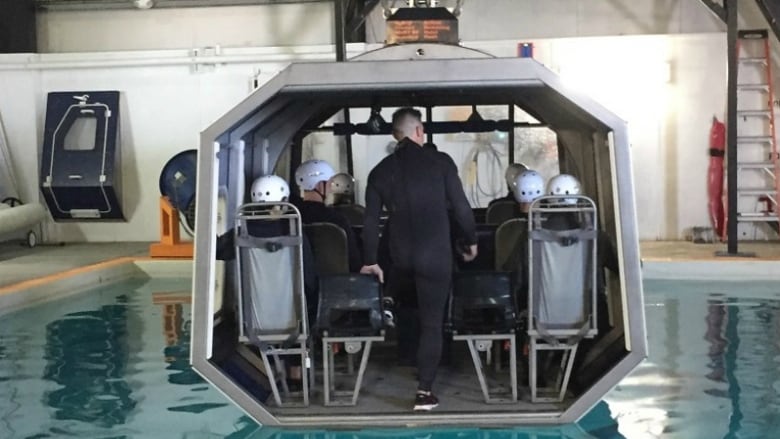Team morale down in your workplace? Fake a plane crash

Do you trust your colleagues at work? Do they trust you?
Now, a company is offering extreme survival classes as a means to boost team morale. This includes a fake airplane crash into water where work colleagues have to find a way to escape.
We've had a ditching survivor come to us for training ... and it wasn't traumatic for them. It let them kind of work through their own fears because they were able to conquer it in the pool.- Maria Hanna
Maria Hanna is the president of Survival Systems USA. She spoke with As It Happens guest host Helen Mann about how the simulation works.
MARIA HANNA: They will enter the simulator. When they sit down they'll buckle in and fasten their harness. The simulator will go up into the air. And they'll hear a "ditching, ditching, ditching". When they hear that they're going to assume a brace position, because we want to prepare for the impact. And the simulator will begin going down into the water. It will start a slow roll so that it goes into a full inverted position ... and they're going to hold that brace position until the motion stops. And that really means the wall of water has passed you by so that know you can move underwater.
They're going to sit up out of their seat. They're going to use their out-board hand to come over and find the handle that jettisons the door, and they're going to jettison the door. That same hand is going to hold on the the air frame so that they know they have an open exit. Their other hand, their in-board hand, is going to travel to where the seatbelt buckle is. It's going to unbuckle the seatbelt, and they they're going to pull themselves out of the exit. So these are the steps.
HELEN MANN: What else is going on at the time, because I understand that you play loud pop songs sometimes?
MH: We do that for the leadership training courses. For those we try to make the environment a little less stressful. So if they're doing life-raft riding exercises, we might play "Singin' In The Rain". If they're here for aviation training we don't play music, but we do environmental effects. So if they're flying in inclement weather they might see rain, thunder, lightning. So it' basically the perfect storm inside the building.
HM: Now you teach these survival classes to people who actually might find themselves trying to escape a crash. Members of the National Guard, police, the army. But you're now offering these mock life-or-death exercises, as team-building exercises. Where did that idea come from?
MH: So we were approached about a year ago by a pretty large corporate body that was interested in doing this because they had been looking for different versions of team-building. And they asked us if we could develop something. So we did and what we found is that the program has really taken off.

HM: The description of the procedure, that you gave us...you know, one hand does one thing and one hand does the other. That's, I guess, is the ideal scenario if people follow instructions. How often does that not happen -- that people maybe panic and feel a little traumatized?
MH: I wouldn't say they feel traumatized. I think it's more along the lines of people will make small mistakes along the way. Part of our role as instructors is to maybe intervene before they get to the stage of panic.
HM: Do you worry about PTSD though?
MH: If somebody says this is not something I want to do and I'm not comfortable with, we can actually alter the requirements so that they don't have to participate.
HM: The companies who pay for this training see it as a valid exercise. If one of their employees decides they don't want to take part because they're scared. What about the fear of being labelled 'not a team player'?
MH: We've already had that. And what we have found is that the rest of the group chimes-in and helps them get through their fear. It doesn't force them to participate but actually pulls them into the group even more. They were actually, in some ways, looked at in a slightly better light because they were wiling to verbalize their fears.

HM: Well, it sounds both interesting and kind of scary.
MH: Scary in a fun way.
HM: Yeah, I guess for many people it would be. But I actually know someone who survived a plane crash and can't even talk about plane crashes, never mind go through something like this. There has to be a point where somebody who has gone through a traumatizing experience, maybe shouldn't be doing this?
MH: For some people I would say that's true. But we've had a ditching survivor come to us for training. And they had flashbacks if you will, of their actual crash, and it wasn't traumatic for them. It was actually a catharsis for them. It let them kind of work through their own fears because they were able to conquer it in the pool.
This interview has been edited for length and clarity. For more on this story, listen to our full interview with Maria Hanna.